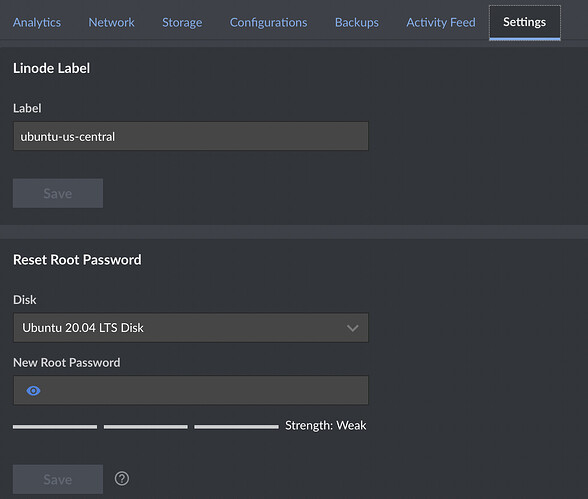thanks to Jeff and team, i can now rapidly deploy a linux system. I am at my 4th episode. My challenge for which i have exhausted all the tricks in my book is using ssh to remotely. Have done it countless times but this last one is doing my head in…
Steps
Installed a new ubuntu. Updated wtih all the latest packages. Created keys with ssh-keygen.
used chmod to give 700 access to .ssh
used chmod to give 600 access to authorized_keys
copied content of public keys to authorized_keys
archived known_hosts to …old
removed existing known_hosts
tried ssh root@x…x.xx.x. didn’t work (previously using ssh)
tried ssh-copy-id root@x.x.x.x didn’t work
complains of permission
used ssh -v to debug…cannot figure out the issue
those with keen eyes and expertise to help please
xxxxxxxxxxxxxxxxxxxxxxxxxxxxxxxxxxxxxxxxxxxxxxxxxxxxxxxxxxxxxxxxxxxxxxxxxxxxxx
user@ubuntuPC:~$ ssh -v root@x.x.x.x
OpenSSH_8.2p1 Ubuntu-4ubuntu0.4, OpenSSL 1.1.1f 31 Mar 2020
debug1: Reading configuration data /etc/ssh/ssh_config
debug1: /etc/ssh/ssh_config line 19: include /etc/ssh/ssh_config.d/.conf matched no files
debug1: /etc/ssh/ssh_config line 21: Applying options for *
debug1: Connecting to x.x.x.x [x.x.x.x] port 22.
debug1: Connection established.
debug1: identity file /home/user/.ssh/id_rsa type 0
debug1: identity file /home/user/.ssh/id_rsa-cert type -1
debug1: identity file /home/user/.ssh/id_dsa type -1
debug1: identity file /home/user/.ssh/id_dsa-cert type -1
debug1: identity file /home/user/.ssh/id_ecdsa type -1
debug1: identity file /home/user/.ssh/id_ecdsa-cert type -1
debug1: identity file /home/user/.ssh/id_ecdsa_sk type -1
debug1: identity file /home/user/.ssh/id_ecdsa_sk-cert type -1
debug1: identity file /home/user/.ssh/id_ed25519 type -1
debug1: identity file /home/user/.ssh/id_ed25519-cert type -1
debug1: identity file /home/user/.ssh/id_ed25519_sk type -1
debug1: identity file /home/user/.ssh/id_ed25519_sk-cert type -1
debug1: identity file /home/user/.ssh/id_xmss type -1
debug1: identity file /home/user/.ssh/id_xmss-cert type -1
debug1: Local version string SSH-2.0-OpenSSH_8.2p1 Ubuntu-4ubuntu0.4
debug1: Remote protocol version 2.0, remote software version OpenSSH_8.2p1 Ubuntu-4ubuntu0.3
debug1: match: OpenSSH_8.2p1 Ubuntu-4ubuntu0.3 pat OpenSSH compat 0x04000000
debug1: Authenticating to x.x.x.x:22 as ‘root’
debug1: SSH2_MSG_KEXINIT sent
debug1: SSH2_MSG_KEXINIT received
debug1: kex: algorithm: curve25519-sha256
debug1: kex: host key algorithm: ecdsa-sha2-nistp256
debug1: kex: server->client cipher: chacha20-poly1305@openssh.com MAC: compression: none
debug1: kex: client->server cipher: chacha20-poly1305@openssh.com MAC: compression: none
debug1: expecting SSH2_MSG_KEX_ECDH_REPLY
debug1: Server host key: ecdsa-sha2-nistp256 SHA256:ABEW0XEmv9AIZ7kpbx1iN8W7jHZrCao8nqJzjzY1VHE
debug1: Host ‘x.x.x.x’ is known and matches the ECDSA host key.
debug1: Found key in /home/user/.ssh/known_hosts:1
debug1: rekey out after 134217728 blocks
debug1: SSH2_MSG_NEWKEYS sent
debug1: expecting SSH2_MSG_NEWKEYS
debug1: SSH2_MSG_NEWKEYS received
debug1: rekey in after 134217728 blocks
debug1: Will attempt key: /home/user/.ssh/id_rsa RSA SHA256:2dUGRDiEqYJfHqegNaahC2CUJkF2qK5XIxO7JZkBe3o agent
debug1: Will attempt key: user@ubuntuPC RSA SHA256:qz22rniYxFqj+NVAfpCm5sgt1/CouoUWJjJi178Lxq4 agent
debug1: Will attempt key: /home/user/.ssh/id_dsa
debug1: Will attempt key: /home/user/.ssh/id_ecdsa
debug1: Will attempt key: /home/user/.ssh/id_ecdsa_sk
debug1: Will attempt key: /home/user/.ssh/id_ed25519
debug1: Will attempt key: /home/user/.ssh/id_ed25519_sk
debug1: Will attempt key: /home/user/.ssh/id_xmss
debug1: SSH2_MSG_EXT_INFO received
debug1: kex_input_ext_info: server-sig-algs=<ssh-ed25519,sk-ssh-ed25519@openssh.com,ssh-rsa,rsa-sha2-256,rsa-sha2-512,ssh-dss,ecdsa-sha2-nistp256,ecdsa-sha2-nistp384,ecdsa-sha2-nistp521,sk-ecdsa-sha2-nistp256@openssh.com>
debug1: SSH2_MSG_SERVICE_ACCEPT received
debug1: Authentications that can continue: publickey
debug1: Next authentication method: publickey
debug1: Offering public key: /home/user/.ssh/id_rsa RSA SHA256:2dUGRDiEqYJfHqegNaahC2CUJkF2qK5XIxO7JZkBe3o agent
debug1: Authentications that can continue: publickey
debug1: Offering public key: user@ubuntuPC RSA SHA256:qz22rniYxFqj+NVAfpCm5sgt1/CouoUWJjJi178Lxq4 agent
debug1: Server accepts key: user@ubuntuPC RSA SHA256:qz22rniYxFqj+NVAfpCm5sgt1/CouoUWJjJi178Lxq4 agent
debug1: Authentications that can continue: publickey
debug1: Trying private key: /home/user/.ssh/id_dsa
debug1: Trying private key: /home/user/.ssh/id_ecdsa
debug1: Trying private key: /home/user/.ssh/id_ecdsa_sk
debug1: Trying private key: /home/user/.ssh/id_ed25519
debug1: Trying private key: /home/user/.ssh/id_ed25519_sk
debug1: Trying private key: /home/user/.ssh/id_xmss
debug1: No more authentication methods to try.
root@x.x.x.x: Permission denied (publickey).
user@ubuntuPC:~$ ssh-copy-id root@x.x.x.x
/usr/bin/ssh-copy-id: INFO: attempting to log in with the new key(s), to filter out any that are already installed
/usr/bin/ssh-copy-id: INFO: 2 key(s) remain to be installed – if you are prompted now it is to install the new keys
root@x.x.x.x: Permission denied (publickey).





